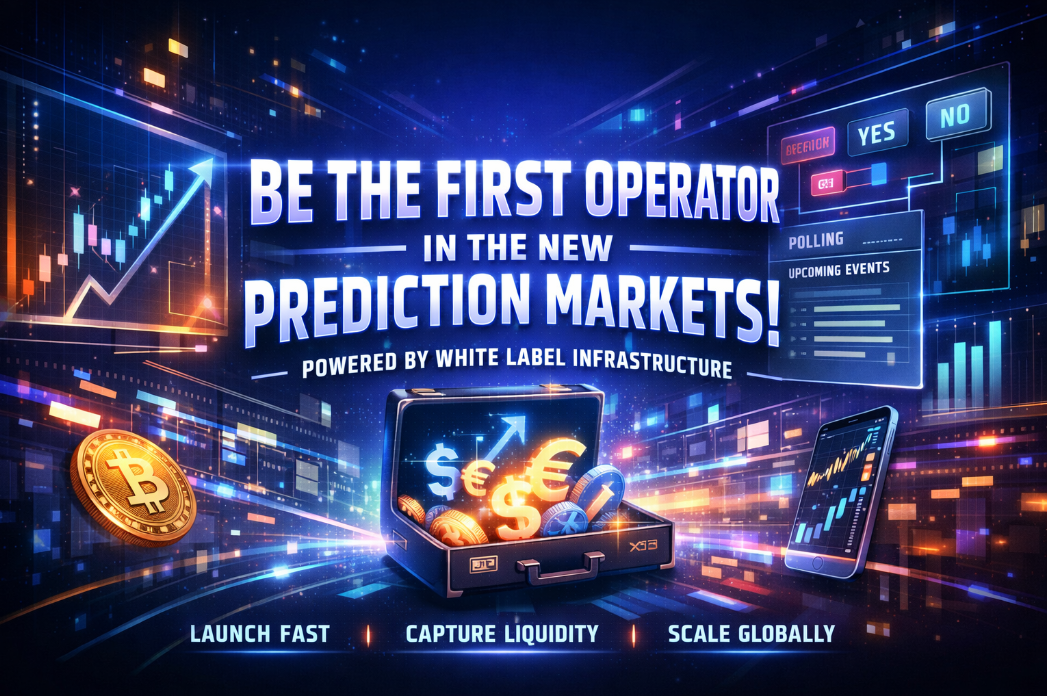Becoming the First Operator in the Next Infrastructure Wave
Why White-Label Prediction Market Platforms Create Strategic Advantage
The digital economy repeatedly demonstrates one clear pattern: the companies that control infrastructure layers capture the largest long-term value. While product innovation sparks early attention, it is infrastructure that scales industries, enables ecosystems, and creates durable competitive moats. Today, prediction markets are entering the early stage of such an infrastructure transformation.
A new generation of platforms is emerging that combines trading, gaming mechanics, collective intelligence, and digital finance into unified experiences. The opportunity is not simply to build another application—it is to become one of the first operators powered by a scalable white-label infrastructure capable of supporting the next decade of prediction-driven platforms.
For an overview of the infrastructure concept referenced in this article, see the official pitch:
1. Prediction Markets Are Entering a Structural Growth Phase
Prediction markets have existed for decades in academic, experimental, and niche financial environments. However, the structural conditions that limited their expansion are rapidly disappearing. Several macro-level changes are now accelerating adoption:
- Convergence between trading, gaming, and entertainment experiences
- Global adoption of digital wallets and crypto-enabled payments
- Rising demand for social and community-driven financial participation
- Expansion of creator-driven communities that want monetizable engagement tools
- Increasing acceptance of probabilistic forecasting tools across industries
What once required sophisticated infrastructure and highly specialized knowledge can now be delivered to mainstream audiences. This transition mirrors earlier shifts in e-commerce, creator platforms, and decentralized finance: once infrastructure becomes modular and accessible, exponential ecosystem growth follows.
Prediction markets are currently positioned at the beginning of this curve.
2. Why Infrastructure Layers Capture the Largest Market Share
Digital market history consistently shows that infrastructure providers benefit disproportionately compared to single-product companies. Consider the evolution of payments, cloud computing, e-commerce enablement, and developer platforms. The most valuable companies in each category often did not sell a single end product—they enabled thousands of others to do so.
The same dynamic is beginning to emerge in prediction-market ecosystems. Instead of a handful of standalone platforms competing in isolation, the industry is moving toward shared infrastructure models where multiple operators launch branded platforms using a unified technology backbone.
This model produces several compounding advantages:
- Standardized compliance and operational processes
- Shared liquidity and deeper market efficiency
- Reduced launch costs for new operators
- Faster innovation cycles across the ecosystem
- Network effects that strengthen all participants
White-label infrastructure is the mechanism that enables this transformation.
3. The Strategic Importance of Being an Early Operator
Early entry has always mattered in digital markets, but in liquidity-driven ecosystems such as prediction markets, it becomes even more decisive. The first operators benefit from three reinforcing mechanisms:
Liquidity Gravity
Markets with early liquidity attract more participants because users prefer environments where pricing is efficient and participation is meaningful. Early liquidity tends to compound rather than disperse.
Behavioral Anchoring
Users often adopt the first platform they encounter within a category as their default environment. Over time, switching costs—community connections, familiarity, stored balances—reinforce loyalty.
Data Compounding
Early operators accumulate behavioral, transactional, and pricing data that enables better risk management, more accurate pricing models, and superior user experience optimization.
These advantages are extremely difficult for later entrants to replicate, regardless of marketing budgets or product improvements.
4. White-Label Infrastructure: The Fastest Path to Market Leadership
Launching a prediction-market platform from scratch typically requires years of development and significant capital investment. Core components include:
- Trading and market-matching engines
- Wallet and payment infrastructure
- Risk management systems
- Compliance frameworks
- Market resolution systems
- Administrative dashboards and analytics
- Fraud detection and monitoring tools
White-label infrastructure dramatically reduces the complexity of this process. Instead of building every layer independently, operators can deploy a fully functional platform built on a proven backend while focusing resources on branding, marketing, partnerships, and community growth.
The infrastructure approach described in the pitch outlines a unified architecture that integrates wallet functionality, liquidity management, and modular prediction-market tools within a single ecosystem:
5. Unified Wallets and the Economics of Engagement
One of the most transformative structural improvements in modern digital platforms is the unified wallet model. Traditional platforms often segment balances across multiple products, forcing users to move funds between environments. This fragmentation reduces engagement and limits revenue potential.
Unified wallets change user behavior in several ways:
- Funds remain within the ecosystem longer
- Cross-product engagement increases
- Transaction frequency rises
- User lifetime value expands
- Platform liquidity deepens organically
When prediction markets operate within a unified wallet environment, they benefit from existing balances and user familiarity, lowering friction for participation and improving retention metrics across the entire ecosystem.
6. Multi-Revenue Platform Economics
Prediction-market platforms powered by shared infrastructure can generate diversified revenue streams beyond traditional transaction fees. Examples include:
- Market creation fees
- Trading commissions
- Spread capture mechanisms
- Premium analytics subscriptions
- Data licensing
- Engagement-based monetization tools
- B2B licensing of prediction modules
This layered revenue structure improves economic resilience and allows operators to optimize monetization without over-relying on any single income source. Infrastructure providers benefit further by participating in ecosystem-wide activity growth rather than depending on the success of a single brand.
7. Global Expansion Through Multi-Brand Deployment
White-label infrastructure enables rapid geographic expansion through multi-brand deployment strategies. Instead of building independent systems for each jurisdiction, operators can launch localized brands while maintaining a unified technological core.
Advantages of this approach include:
- Faster entry into new markets
- Lower development costs per region
- Consistent operational control across brands
- Centralized liquidity management
- Flexible compliance configuration
This strategy has already proven effective in other digital industries such as iGaming, fintech, and multi-regional SaaS ecosystems. Prediction-market platforms are now positioned to adopt similar scaling models.
8. Risk Reduction Through Shared Infrastructure
Early-stage entrepreneurs often underestimate the operational complexity of launching regulated or semi-regulated financial-interaction platforms. Infrastructure partnerships significantly reduce risk exposure by providing tested technology, operational frameworks, and standardized compliance mechanisms.
White-label ecosystems can offer:
- Proven backend reliability
- Integrated monitoring systems
- Risk-control frameworks
- Administrative management tools
- Security infrastructure
By reducing operational risk, founders can focus on growth strategy rather than technical uncertainty, accelerating time-to-market and improving capital efficiency.
9. Network Effects in Prediction-Market Ecosystems
Prediction markets exhibit strong network effects. As the number of participants grows, several reinforcing cycles emerge:
- More users create more markets
- More markets increase engagement
- Higher engagement attracts liquidity
- Greater liquidity improves pricing accuracy
- Better pricing attracts professional participants
- Professional participation increases market credibility
White-label ecosystems accelerate this cycle because multiple operators contribute to the same infrastructure backbone, strengthening network effects across the entire ecosystem rather than isolating them within single platforms.
10. The Current Window of Opportunity
Industries rarely offer extended periods where infrastructure layers remain open for new entrants. Once a dominant set of providers establishes itself, barriers to entry increase dramatically due to network effects, liquidity concentration, and ecosystem integrations.
Prediction markets are currently in the narrow window between early experimentation and full infrastructure consolidation. During this phase, early operators can still capture meaningful market share, establish regional leadership positions, and build long-term defensible communities.
White-label infrastructure enables entrepreneurs to act within this window rather than spending years building proprietary technology while competitors launch sooner.
11. Entrepreneurial Advantages of Early Platform Ownership
Operating one of the first platforms within a new digital category offers benefits beyond immediate revenue generation. Early operators gain:
- Category authority and brand recognition
- Media positioning as industry pioneers
- Stronger negotiating power with partners
- Early community loyalty
- Strategic attractiveness to investors
These advantages often translate into accelerated valuation growth compared to later entrants who must compete in crowded markets with higher customer acquisition costs.
12. Portfolio-Driven Platform Strategies
Another emerging strategy enabled by white-label infrastructure is the creation of platform portfolios. Rather than launching a single brand, operators can experiment with multiple niche platforms targeting different audiences or regions while maintaining a unified backend.
This portfolio approach allows founders to:
- Test new verticals rapidly
- Identify high-growth segments
- Scale successful brands quickly
- Shut down underperforming experiments with minimal loss
Such experimentation-driven scaling has become a common growth model in modern digital industries and is particularly well suited to infrastructure-enabled prediction-market ecosystems.
13. The Compounding Advantage of Early Liquidity Ownership
Liquidity ownership is one of the most durable strategic assets in financial-interaction platforms. Once users and traders establish habits around a particular environment, migration becomes unlikely unless major structural disruptions occur.
Operators who launch early within a unified infrastructure environment gain access to liquidity flows that can grow alongside the ecosystem. Over time, this liquidity becomes a competitive moat that protects market position and strengthens pricing efficiency.
14. Prediction Markets as a New Category of Digital Interaction
Prediction markets are evolving beyond simple wagering or forecasting tools. They represent a hybrid category combining:
- Collective intelligence systems
- Financial interaction layers
- Social engagement mechanics
- Gamified participation frameworks
- Data-driven analytics environments
Because of this hybrid nature, prediction markets appeal to diverse sectors including fintech companies, media organizations, creator platforms, and gaming ecosystems. White-label infrastructure enables these sectors to integrate prediction tools without building proprietary systems from scratch.
15. Why Timing Matters More Than Complexity
Entrepreneurs often assume that the most complex product wins. In reality, timing combined with scalable infrastructure frequently determines long-term leadership. Launching earlier allows operators to accumulate users, liquidity, and data advantages that compound over time.
White-label platforms enable precisely this advantage: entering the market early without sacrificing technical sophistication or operational reliability.
For an overview of the infrastructure architecture enabling such launches, see:
16. The Next Five Years: What to Expect
Over the next several years, prediction-market ecosystems are likely to experience several structural developments:
- Rapid expansion of operator networks powered by shared infrastructure
- Emergence of regional category leaders
- Increased institutional participation in liquidity pools
- Development of analytics-driven forecasting industries
- Consolidation around scalable infrastructure providers
Operators who establish positions early will shape the competitive landscape and define the standards that later entrants must follow.
17. Conclusion: A Rare Infrastructure Moment
Every decade introduces new infrastructure categories that redefine digital markets. Those who participate early often benefit from years of compounded growth and strategic positioning. Prediction markets are entering such a moment today.
White-label infrastructure dramatically lowers the barriers to entry while enabling entrepreneurs, fintech innovators, gaming operators, and digital communities to launch scalable platforms rapidly. More importantly, it creates an opportunity to become one of the first operators in a category that is still forming globally.
Opportunities to enter an industry at the infrastructure expansion phase are rare. When they appear, the decisive factor is not product perfection—it is the willingness to move early, leverage scalable infrastructure, and build community ownership before the market becomes saturated.
Learn more about the infrastructure approach described in this article:
Key Takeaway: The next generation of prediction-market platforms will be defined not only by innovation but by infrastructure positioning. Entrepreneurs who act early, adopt white-label technology, and focus on growth rather than rebuilding backend systems from scratch will be best positioned to become category leaders in the years ahead.








